#sources
Text

[Text: This alter’s source is lovecore, My Melody, and Aphrodite.]
Like/Reblog if you save or use
(the dove represents Aphrodite)
#endos dni#system#userbox#did#anti endo#osdd#traumagenic system#system stuff#this alter#alter userbox#mod weeping ❤️#Undescribed#my melody#aphrodite#alter source#Source#sources#lovecore
23 notes
·
View notes
Text

Please Pour Some Rain! (2018) by Taiwanese textile and quilt artist, Lin Hsin-Chen (born in 1974)
27K notes
·
View notes
Text
HELP
ON LUCIFER MORNINGSTAR'S WIKIPEDIA PAGE

WHAT THE FUCK WEDHFCGDHSJEDFVGHFDESW



I'M CRYING WHO WROTE THIS
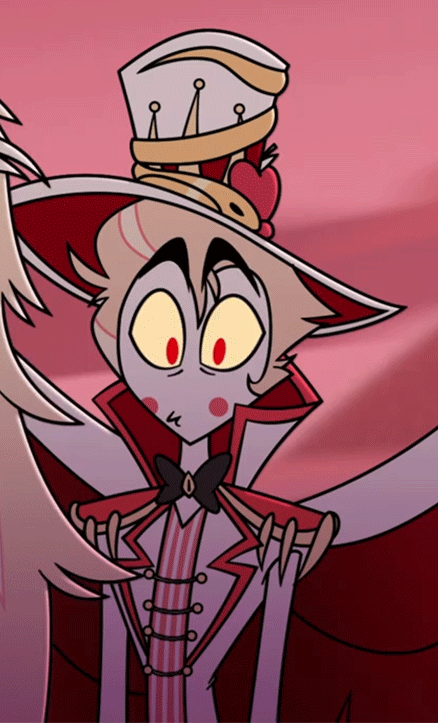
#hazbin hotel#lucifer morningstar#WHY IS THIS ON HIS ACTUAL WIKI#WHICH ARTICLES CALLED HIM A NEW SEX SYMBOL#LINKS#SOURCES#sidrabbles
896 notes
·
View notes
Note
Not to doubt, im just having finding information about the rafah bombings when I search it up, do you have any links about it?
Palestinians on Twitter (X):
https://x.com/insiderworld_1/status/1767015962467807425?s=46
https://x.com/insiderworld_1/status/1766937544329974026?s=46
Al Jazeera:

712 notes
·
View notes
Text
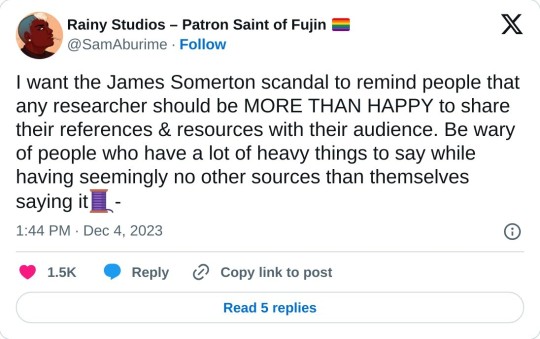
I posted this to Twitter but it needs to be seen here too.
(Those out of the loop, popular gay YouTube "video essayist" James Somerton was found to plagiarize the large majority (90%+) of this videos word for word. (source))
"I want the James Somerton scandal to remind people that any researcher should be MORE THAN HAPPY to share their references & resources with their audience.
Be wary of people who have a lot of heavy things to say while having seemingly no other sources than themselves saying it because that can be a sign of 3 things:
1) they like to pass off other people's ideas as their own, or
2) they don't actually have reliable or consistent sources supporting what they're saying & want to appear like an authority, or
3) purposefully spreading disinformation
People who genuinely care about research, awareness, and education will gladly share sources and research articles they find with other people, no strings attached. Obviously, the next step is confirming the validity of those sources, but having sources is the bare minimum.
In this age of Do-It-Yourself video essayist "experts" and Influencers, staying diligent and combating misinformation and bias is more important than ever. Get. Those. Citations. Sources, sources sources."
604 notes
·
View notes
Note
I totally understand and can empathize with fat activists when it comes to medical fatphobia. But I do think its important to provide nuance to this topic.
A lot of doctors mention weight loss, particularly for elective surgeries, because it makes the recovery process easier (Particularly with keeping sutures in place) and anesthetic safer.
I feel like its still important to mention those things when advocating for fat folks. Safety is important.
What you're talking about is actually a different topic altogether - the previous ask was not about preparing for surgery, it was about dieting being the only treatment option for anon's chronic pain, which was exacerbating their ed symptoms. Diets have been proven over and over again to be unsustainable (and are the leading predictor of eating disorders). So yeah, I felt that it was an inappropriate prescription informed more by bias than actual data.
(And side note: This study on chronic pain and obesity concluded that weight change was not associated with changes of pain intensity.)
If you want to discuss the risk factor for surgery, sure, I think that's an important thing to know - however, most fat people already know this and are informed by their doctors and surgeons of what the risks are beforehand, so I'm not really concerned about people being uninformed about it.
I'm a fat liberation activist, and what I'm concerned about is bias. I'm concerned that there are so many BMI cutoffs in essential surgeries for fat patients, when weight loss is hardly feasible, that creates a barrier to care that disproportionately affects marginalized people with intersecting identities.
It's also important to know that we have very little data around the outcomes of surgery for fat folks that isn't bariatric weight loss surgery.
A new systematic review by researchers in Sydney, Australia, published in the journal Clinical Obesity, suggests that weight loss diets before elective surgery are ineffective in reducing postoperative complications.
CADTH Health Technology Review Body Mass Index as a Measure of Obesity and Cut-Off for Surgical Eligibility made a similar conclusion:
Most studies either found discrepancies between BMI and other measurements or concluded that there was insufficient evidence to support BMI cut-offs for surgical eligibility. The sources explicitly reporting ethical issues related to the use of BMI as a measure of obesity or cut-off for surgical eligibility described concerns around stigma, bias (particularly for racialized peoples), and the potential to create or exacerbate disparities in health care access.
Nicholas Giori MD, PhD Professor of Orthopedic Surgery at Stanford University, a respected leader in TKA and THA shared his thoughts in Elective Surgery in Adult Patients with Excess Weight: Can Preoperative Dietary Interventions Improve Surgical Outcomes? A Systematic Review:
“Obesity is not reversible for most patients. Outpatient weight reduction programs average only 8% body weight loss [1, 10, 29]. Eight percent of patients denied surgery for high BMI eventually reach the BMI cutoff and have total joint arthroplasty [28]. Without a reliable pathway for weight loss, we shouldn’t categorically withhold an operation that improves pain and function for patients in all BMI classes [3, 14, 16] to avoid a risk that is comparable to other risks we routinely accept.
It is not clear that weight reduction prior to surgery reduces risk. Most studies on this topic involve dramatic weight loss from bariatric surgery and have had mixed results [13, 19, 21, 22, 24, 27]. Moderate non-surgical weight loss has thus-far not been shown to affect risk [12].
Though hard BMI cutoffs are well-intended, currently-used BMI cutoffs nearly have the effect of arbitrarily rationing care without medical justification. This is because BMI does not strongly predict complications. It is troubling that the effects are actually not arbitrary, but disproportionately affect minorities, women and patients in low socioeconomic classes.
I believe that the decision to proceed with surgery should be based on traditional shared-decision making between the patient and surgeon. Different patients and different surgeons have different tolerances to risk and reward. Giving patients and surgeons freedom to determine the balance that is right for them is, in my opinion, the right way to proceed.”
I agree with Dr. Giori on this. And I absolutely do not judge anyone who chooses to lose weight prior to a surgery. It's upsetting that it is the only option right now for things like safe anesthesia. Unfortunately, patients with a history of disordered eating (which is a significant percentage of fat people!) are left out of the conversation. There is certainly risk involved in either option and it sucks. I am always open to nuanced discussion, and the one thing I remain firm in is that weight loss is not the answer long-term. We should be looking for other solutions in treating fat patients and studying how to make surgery safer. A lot of this could be solved with more comprehensive training and new medical developments instead of continuously trying to make fat people less fat.
642 notes
·
View notes
Text
List of interesting ressources pertaining to norse paganism, scandinavian folklore and history, and nordic religions in general
These are sources I have personally used in the context of my research, and which I've enjoyed and found useful. Please don’t mind if I missed this or that ressource, as for this post, I focused solely on my own preferences when it comes to research. I may add on to this list via reblog if other interesting sources come to my mind after this has been posted. Good luck on your research! And as always, my question box is open if you have any questions pertaining to my experiences and thoughts on paganism.
Mythology
The Viking Spirit: An Introduction to Norse Mythology and Religion
Dictionnary of Northern Mythology
The Prose and Poetic Eddas (online)
Grottasöngr: The Song of Grotti (online)
The Poetic Edda: Stories of the Norse Gods and Heroes
The Wanderer's Hávamál
The Song of Beowulf
Rauðúlfs Þáttr
The Penguin Book of Norse Myths: Gods of the Vikings (Kevin Crossley-Holland's are my favorite retellings)
Myths of the Norsemen From the Eddas and the Sagas (online) A source that's as old as the world, but still very complete and an interesting read.
The Elder Eddas of Saemung Sigfusson
Pocket Hávamál
Myths of the Pagan North: Gods of the Norsemen
Lore of the Vanir: A Brief Overview of the Vanir Gods
Anglo-Saxon and Norse Poems
Gods of the Ancient Northmen
Gods of the Ancient Northmen (online)
Two Icelandic Stories: Hreiðars Þáttr and Orms Þáttr
Two Icelandic Stories: Hreiðars Þáttr and Orms Þáttr (online)
Sagas
Two Sagas of Mythical Heroes: Hervor and Heidrek & Hrólf Kraki and His Champions (compiling the Hervarar saga ok Heiðreks and the Hrólfs saga kraka)
Icelandic Saga Database (website)
The Saga of the Jómsvíkings
The Heimskringla or the Chronicle of the Kings of Norway (online)
Stories and Ballads of the Far Past: Icelandic and Faroese
Heimskringla: History of the Kings of Norway
The Saga of the Volsungs: With the Saga of Ragnar Lothbrok
The Saga of the Volsungs (online) Interesting analysis, but this is another pretty old source.
The Story of the Volsungs (online) Morris and Magnusson translation
The Vinland Sagas
Hákon the Good's Saga (online)
History of religious practices
The Viking Way: Magic and Mind in Late Iron Age Scandinavia
Nordic Religions in the Viking Age
Agricola and Germania Tacitus' account of religion in nordic countries
Myths and Symbols in Pagan Europe: Early Scandinavian and Celtic Religions
Tacitus on Germany (online)
Scandinavia and the Viking Age
Viking Age Iceland
Landnámabók: Book of the Settlement of Iceland (online)
The Age of the Vikings
Gesta Danorum: The Danish History (Books I-IX)
The Sea Wolves: a History of the Vikings
The Viking World
Guta Lag: The Law of the Gotlanders (online)
The Pre-Christian Religions of the North This is a four-volume series I haven't read yet, but that I wish to acquire soon! It's the next research read I have planned.
Old Norse Folklore: Tradition, Innovation, and Performance in Medieval Scandinavia
Children of Ash and Elm: A History of the Vikings
The Penguin Historical Atlas of the Vikings by John Haywood
Landnámabók: Viking Settlers and Their Customs in Iceland
Nordic Tales: Folktales from Norway, Sweden, Finland, Iceland and Denmark For a little literary break from all the serious research! The stories are told in a way that can sometimes get repetitive, but it makes it easier to notice recurring patterns and themes within Scandinavian oral tradition.
Old Norse-Icelandic Literature: A Short Introduction
Saga Form, Oral Prehistory, and the Icelandic Social Context
An Early Meal: A Viking Age Cookbook and Culinary Oddyssey
Runes & Old Norse language
Uppland region runestones and their translations
Viking Language 1: Learn Old Norse, Runes, and Icelandic Sagas and Viking Language 2: The Old Norse Reader
Catalogue of the Manks Crosses with Runic Inscriptions
Old Norse - Old Icelandic: Concise Introduction to the Language of the Sagas
A Companion to Old Norse-Icelandic Literature and Culture
Nordic Runes: Understanding, Casting, and Interpreting the Ancient Viking Oracle
YouTube channels
Ocean Keltoi
Arith Härger
Old Halfdan
Jackson Crawford
Wolf the Red
Sigurboði Grétarsson
Grimfrost
(Reminder! The channel "The Wisdom of Odin", aka Jacob Toddson, is a known supporter of pseudo scientific theories and of the AFA, a folkist and white-supremacist organization, and he's been known to hold cult-like, dangerous rituals, as well as to use his UPG as truth and to ask for his followers to provide money for his building some kind of "real life viking hall", as supposedly asked to him by Óðinn himself. A source to avoid. But more on that here.)
Websites
The Troth
Norse Mythology for Smart People
Voluspa.org
Icelandic Saga Database
Skaldic Project
Life in Norway This is more of a tourist's ressources, but I find they publish loads of fascinating articles pertaining to Norway's history and its traditions.
#ressources#masterpost#heathenry#research#sources#norse paganism#norse gods#spirituality#polytheism#deity work#pagan#paganism#deities#norse polytheism#mythology#eddas#sagas
575 notes
·
View notes
Text
We ask your questions so you don’t have to! Submit your questions to have them posted anonymously as polls.
#polls#incognito polls#anonymous#tumblr polls#tumblr users#questions#tumblr#fact checking#media literacy#sources#polls about the internet
289 notes
·
View notes
Text

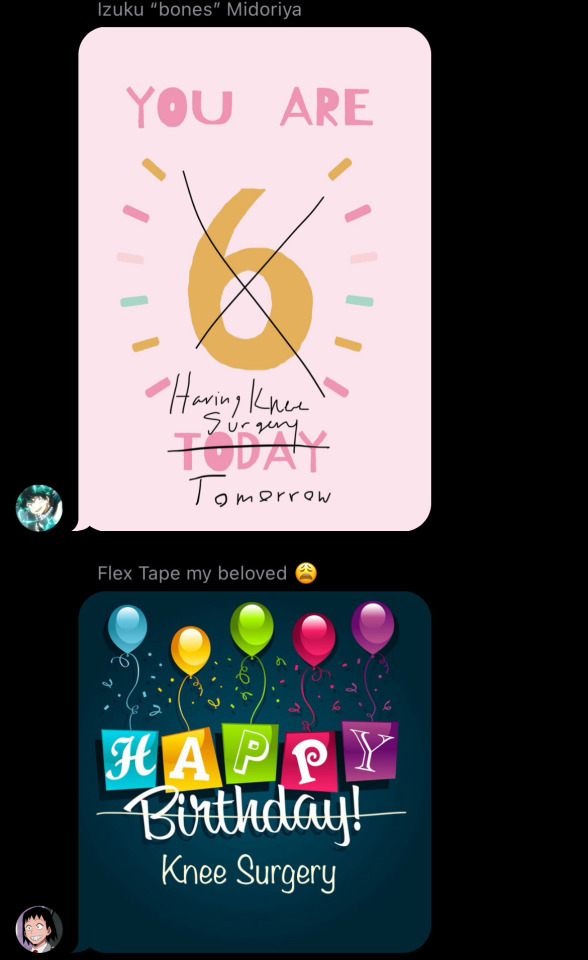
It’s their tradition 💕
Thanks anon I love this lolol
#ochako uraraka#sero hanta#momo yaoyorozu#midoriya izuku#mina ashido#bnha#mha#incorrect bnha quotes#chat fic#incorrect my hero academia quotes#anon soup#headcanon#twitter#social media#bnha incorrect quotes#sources
215 notes
·
View notes
Note
I recently received the following message from a (former?) friend of mine:
okay I am being so genuine right now: since you seem to have educated yourself on what is bothering jewish people about the pro-palestine movement, /what/ is it. I genuinely cannot see and have not interacted with any pro-palestine activists that have actively advocated for the murder of jewish people. I have seen Israelis who have justified the breaking of the truce to bomb Palestinians returning to north gaza. Note I said Israelis and not Jews.
I responded by essentially saying that there's a lot there and I'll need some time to compile and articulate.
I mention this in order to ask if you (or any of your followers/any Jewish tumblr users reading this) have anything specific you'd like to point me toward (search keywords/starting points, links, thoughts, interpret however) that's not already on the list of what i'm planning to discuss (included after this paragraph), anything you specifically want me to read, suggestions of where to place emphasis, or any stories or thoughts you'd like me to pass on to him directly.
current tentative list i'm planning on going over with him, in no particular order:
clarification of scope of conversation (specific to non-jewish western left rather than on the ground or from affected groups)
dual loyalty accusations and harrassment of random jews that have nothing to do with medinat israel
taking discussion of antisemitism in bad faith by default
opportunistic use of the issue by more active antisemites, broad failure to to recognize when that's occuring
uncritical sharing of dogwhistles, conspiratorial thinking
outsiders and newcomers attempting to speak on the matter with authority we don't have
neglect of fact-checking and widespread mis- and disinformation
tokenization of antizionist jews and "jews" - jvp in particular i need to look into more
glorification of hamas and disregard for israeli civilians
misuse, misunderstanding, and demonization of zionism
application of western frameworks of colonization when not applicable
binary good guys/bad guys framing, contrarianism, taking "sides"
might talk about bds e.g. the whole boston map thing but not yet confident on this one, need to do a lot more digging
denial of jewish history - focus on denial of eretz israel as the jewish homeland, holocaust inversion, treating absolutely anything but especially those as trivial or "so long ago"
treating or discussing jews and/or israelis as monolithic
double standards and singling out of israel, holding it as inherently more suspect or less legitimate than any other state
@faggotry-enjoyer Oh man! This is such a good ask!!!! I was going to wait until after work to answer, but your list is so good and so thorough that it relieves a lot of the work I’d have to do.
Some stuff I linked overlaps with your list but I wanted to provide links to these points when possible.
Another thing that bothers me in particular about the western leftist movements’ approach to pro-Palestine conversations (and more: I am critiquing their approach to supporting Palestine not their support itself):
The absolute inability for Jews anywhere to even discuss provocation from Hamas, the history of bombs coming into Israel out of Palestine, or any other act of aggression from Hamas. Anytime we try to discuss anything even remotely nuanced or historical we are told “there’s no excuse for genocide” or “I guess you just love killing Palestinian babies” when that’s not what we are saying at all. Or, more often, the assumption that we are flat out lying about Hamas’ tactics and use of human shields and Palestinian civilian suppression and their view of the disposability of Palestinian lives.
The blanket condemnation of Zionism without understanding that it is a complex philosophy with several movements and differing goals.
The complete lack of media literacy.
The specific dismissal of From the River to the Sea as a term stolen from a Palestinian civilians who desire to express hope in a fully free and equal future but people who use it explicitly to call for the death of Jews. And the weaponization of the phrase to make it a death threat to any Jew who points this out.
The lack of specificity in terms line “Free Palestine.” Yes, Palestinians deserve full and equal freedoms and representation in government. This is a wonderful thing that I support with my whole heart. But that doesn’t change the fact that many bad actors and antisemites are hiding within the Free Palestine movement who are specifically manipulating the phrase to imply free Palestine FROM JEWS—both in terms of their presence in the levant at all (which would entail yet another anti-Jewish ethnic cleansing) or simply the murder of the 7 million Jews who exist in Israel. So asking a Jew why they won’t shout “free Palestine!” At the top of their lungs is taken as a sign that western Jews don’t want Palestinian freedom. When actually it’s a refusal to call for their own deaths.
The assumption that western protest tactics are inherently useful in this conflict and the refusal to look to interfaith and intercultural organizations on the ground in I/P who have been doing this longer, better, and more effectively than western groups.
The focus of western efforts on naming one side a victor in this conflict rather than peace for all.
Not understanding how few Jews there are in the world. And relatedly, the dismissal of the fact that the destruction of the modern state of Israel with no solid plan for a shared Palestinian/Israeli solution would mean the loss of sovereignty for half the global Jewish population, which would indeed affect Jews worldwide.
Dismissal of Israeli leftist efforts to oust the Likud and Netanyahu, because it doesn’t fit the narrative of all Israeli Jews being evil.
The sharing of graphic content of 10/7 attacks, dead and injured Palestinian and Israeli children, and calling any victims martyrs without appropriate trigger warning and as a political tactic.
Mocking Jews (yes, even celebrities) who express feeling fearful for their personal safety as antisemitism rises worldwide.
The expulsion of Jews from their non-Jewish communities and friend groups.
Not understanding the magnitude of the Jewish diaspora and its affect on Jewish culture and voice during this conflict.
Other friends and Allies please add on with your own experiences and concerns!
313 notes
·
View notes
Text
Don't Wait for Your Muse (Using Sources)
In the same way that artists collect reference photos, fashion designers collect fabrics and textures, and interior designers collect paint chips, writers must collect sources. A source could be:
Evocative, funny, or interesting dialogue
A description you’ve never heard before
Interesting and rare words
A cool dream you had
A paragraph from a book you love
A specific feeling or experience
Something you saw out in the real world
A snippet of conversation you passed by on the street
A smell that gives you a particular memory
Any other piece of art, writing, music, design, a sense, story, etc. etc.
Essentially, anything that sparks your imagination, that’s evocative of the human experience—of that humanity and closeness we’re always trying to capture. My creative writing prof said to us, “why are you waiting for a ‘muse’? Go to your sources. Don’t just wait for inspiration to strike.”
She cautioned us not to try to make sense when we put together our sources, but rather make meaning. The nice, easy part is that anything you put together will create meaning. So here’s what we gathered to get started, but I also challenge you to carry a journal or a place on your phone to start collecting things you find out in the world.
Choose a one-word or sentence theme that describes your project. For this theme, collect:
A photo, taken by anyone at any time
A poem, written by anyone
A paragraph from a newspaper or magazine article, then scramble it using the “cut up machine”
A screenshot of something posted on social media
A series of text messages, emails, or other communication between parties
A screenshot of the abstract of a scholarly article
Good luck, and if you’re comfortable, I’d love to see your collections!
#writing#writers#writing tips#writing advice#writing inspiration#creative writing#writing community#books#film#filmmaking#screenwriting#novel writing#fanfiction#writeblr#writing sources#sources#inspiration#muse
1K notes
·
View notes
Text
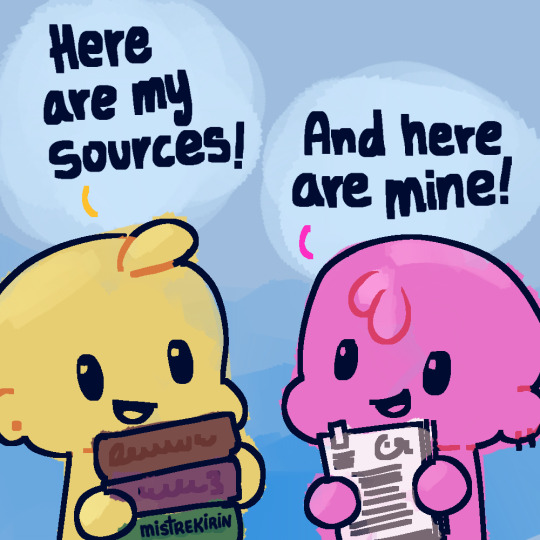
everyone is being so nice lately~
i wonder why
287 notes
·
View notes
Text

from quendergeer on x.com
The USA did nothing to help the Warsaw Ghetto. As they ignored the Warsaw Ghetto, the CIA were recruiting Nazi spies to gather intelligence on the Soviets.
The United States did not get involved in the genocide of Jews in Europe until their power was threatened. So ask yourself now, is the United States funded State of Israel is truly about protecting Jewish people?
#jewish history#jewish radical activism#jewish antizionists#poland#united states#historical documents#sources
460 notes
·
View notes
Note
Do you have a guide/a recommended reading list for getting into Arthurian legends? I’ve been really getting into it in the past few months but I feel like I’m missing out on a lot of the foundations of it. (If you don’t and this is too big of an ask totally feel free to ignore this lol)
hello, anon.
i don't currently although i have plans to add another page to my blog listing medieval texts as well as links to download pdfs of them. i have english translations of texts originating in belarussian, dutch, french, german, hebrew, italian, latin, middle english, and last but not least, welsh.
in the mean time, i've collected for you some key texts that are readily available to read for free online!
le morte d'arthur by sir thomas malory [part 1] [part 2]
the history of the britons by nennius [here]
the mabinogion translated by lady charlotte guest [here]
four romances by chrétien de troyes [here]
parzival by wolfram von eschenbach [part 1] [part 2]
the wedding of sir gawain and dame ragnelle translated by thomas hahn [here]
sir gawain and the green knight translated by j. r. r. tolkien [here]
better translations/formatting forthcoming! enjoy. :^)
#arthurian legend#arthurian legends#arthuriana#le morte d'arthur#sir thomas malory#the history of the britons#nennius#the mabinogion#lady charlotte guest#chrétien de troyes#chretien de troyes#parzival#wolfram von eschenbach#the wedding of sir gawain and dame ragnelle#sir gawain and the green knight#ask#answered#book reccs#book reccomendation#sources#my post
191 notes
·
View notes
Text
The Anti-Bojack: Anti-Intellectualism and the Death of Substance
In the blog essay “Staging Philosophy: the relationship between philosophy and drama”, Kristen Gjesdal opines on the home of philosophy. Many today would consider philosophy a relic of a bygone era with names such as Keikegaard, Voltaire, and Neitzsche. Many don’t know, however, of the close relationship philosophy has always held with the arts. Gjesdal mentions Ibsen in the article, discussing how many playwrights of the time were avid students of philosophy and how many philosophers regarded the arts highly. Nietzsche spoke of social leaders, specifically the religious leaders of his day in Beyond Good and Evil when he wrote, “Men, not great enough, nor hard enough, to be entitled as artists to take part in fashioning man.” Frankly denouncing the power and influence held by the religious men which he felt was more appropriately left in the hands of artists. In fact, Nietzche considered art the definition of culture and hence why he says that artists are the ones who should be responsible for shaping society and defining what it means to be “man”. As such, the expressions of art, poetry to cinema, is a definition of man and inherently a philosophy.
Bojack Horseman is an openly philosophical series that plays with existentialist schools of thought. Having liked several tweets endorsing the comparison of her work to that of Raphael Bob-Waksberg, Vivienne Medrano demands her work be valued the same way. From being favorably compared to Bojack Horseman to being praised as the “Anti-Bojack”. Which begs to question, what does that even mean? First let’s discuss the Philosophy behind Bojack Horseman, then compare the tweets Medrano liked and her series to that of Bojack directly, and then study the overlapping themes and why Medrano’s style of writing makes her storytelling a mockery to the art.
Existentialism in particular has been the darling of the theater for about the last 150 years, though generally ridiculed by “proper” society. For a philosopher to be labeled a nihilist or existentialist was often a denouncement of their school of thought, often for their general rejection of fundamental social structures like ethics. In 1942, writer Albert Camus published his essay The Myth of Sisyphus, rebranding traditional existentialist concepts as Absurd philosophy.
Camus begins his work poised with the question of suicide and whether life is worth living at all. He argues that life is inherently meaningless, an idea originating with Kierkegaard, but while the latter sided with finding purpose in constitutions like religion, Camus argues that religion itself is a philosophical suicide. In the Routledge encyclopedia of philosophy by Charles Guignon, he writes of the criticisms levied against existential and absurdist philosophies in a society awash in moralist anti-intellectualism. He opens this section by saying, “Existentialism has been criticized from a number of different angles. One line of criticism holds that the emphasis on individual freedom and the rejection of absolutes in existentialism tends to undermine ethics; by suggesting that everyday life is ‘absurd’ and by denying the existence of fixed, binding principles for evaluating our actions, existentialists promote an ‘anything-goes’ view of freedom that exacerbates the nihilism already present in contemporary life.” Which comes from this negative misreading of nihilism.
In their video Nihilism: Are We Missing the Point, youtuber Michael Burns of Wisecrack tells an anecdote of his time in grad school where he paraphrases his professor as saying, “This idea of the constant misreadings of Nietzsche’s writings on Nihilism leads to, his words, angry seventeen-year-old atheists.” Which tends to be the issue when discussing concepts such as nihilism, existentialism and absurdist philosophy. Nietzsche, the credited father of the school of thought, is often taken out of context or his views distorted by society’s sensibilities. For one, the quote given earlier extends further into a condemnation of religion by saying, “Such men, with their "equality before God," have hitherto swayed the destiny of Europe; until at last a dwarfed, almost ludicrous species has been produced, a gregarious animal, something obliging, sickly, mediocre, the European of the present day.” Which many an angry seventeen-year-old and moralist has seen as an endorsement of the might-is-right philosophy that nihilism is credited with.
To a lesser extent, Camus writes in The Myth, “I must say what counts is not the best living, but the most living”. It feels like it should be rather straightforward then, the concept of the thought. More equals better, and Camus practically says as much when he later writes “Why should it be essential to love rarely in order to love much?” However, if one follows the first quote to its natural conclusion, he continues, “The most living; in the broadest sense, that rule means nothing. It calls for definition.” His wording may come off confusing as the essay is translated and the theories involved are dense, but Camus clarifies that “most” could mean the sheer number of experiences or the depth of the experience. He is not saying one or the other is the correct answer, but that both are equally valid ways to live one’s life. The focus, then, is not on directing anyone how they should live, but in the manner they should do so. He says, “It is not up to me to wonder if this is vulgar or revolting, elegant or deplorable … Suppose that living in this way were not honorable, then true propriety would command me to be dishonorable.”
Camus, and even Nietzsche, argue that truth is the only ultimate value. It throws back the moralist dilemma by arguing that living to a code of ethics or values when one is not truly that sort of person is to live reprehensibly. Better is it to live authentically “without appeal” as Camus says, than it is to live the lie of following the rules.
Thomas Polzler from the University of Graz in Austria wrote a 2014 article titled “Absurdism as Self-Help: Resolving an Essential Inconsistency with Camus’s Early Philosophy”. Personally, I fundamentally and adamantly disagree with his assessment that there is any sort of inconsistency in Camus’s writings. Camus’s books of The Stranger, The Plague, and The Fall are not inherently inconsistent, but depict his philosophy in layers.
Like water painting, Camus starts with a thin veneer of color, a loose and almost detached protagonist in Meursault from The Stranger. He is a man aware of the absurd as an individual, the story maintaining the focus of a man living aware his life means nothing and thus seems to have an almost neurodivergent disinterested in the world beyond himself. What he feels in the moment is all that matters, so when he commits murder out of feeling uncomfortable from the heat of the sun and the painful blinding of the light, he is then juxtaposed with the ethical society he exists simultaneously within and outside of. Meursault is held up as a sociopath for not wishing to see his mother’s body the night before her funeral and smoking by her coffin. Because he does not cry at her passing, he is deemed a danger to society. Because he goes on a date to a comedy picture the day after, he is denounced as a menace. None of which has anything to do with the man he killed. The trial highlights the absurdity of ethical society and how the moralists demand the appearance of values over actually having them.
In fact, the trial of Meursault closely resembles that of Bojack and Sarah Lynn. The end of season 3, Bojack and Sarah Lynn go on a cross-country drug-fuelled bender to apologize to people Bojack has hurt in the past, stopping at the Griffith Observatory where Bojack has a profound revelation. He talks about living in the moment and how neither the past or future really matters at all. What you did and your legacy don’t matter if you cannot exist now. It is this moment that he realizes Sarah Lynn is not responding. It isn't until season 6 that it is shown that Bojack waited before calling the police and thus played a hand in Sarah Lynn's death. He is taken to civil court by Sarah Lynn's mother and step-father and made to pay them a fine for his involvement. However, is it really justice when Sarah Lynn's mother exploited her in the business and never once supported Sarah Lynn for what she wanted and what her dreams were, or even just who she was? Can one argue that it is justice when Sarah Lynn was sexually abused by her step-father throughout her childhood? Yes, Bojack does have responsibility in Sarah Lynn's death, but so do her parents. The absurdity of it all being that in no way could there ever be justice for Sarah Lynn.
Brief mental health sidebar. While I have to expressly disagree with Polzler’s reasoning, I do agree with his conclusion. Philosophy and especially Absurd existentialism are powerful tools in the journey to self improvement. It is both the line from Bojack where Diane says "That's the thing. I don't think I believe in 'deep down'. I kind of think all you are is just the things that you do." And Dr. Wong in Rick and Morty when she says, “You seem to alternate between viewing your own mind as an unstoppable force and as an inescapable curse. And I think it is because the only truly unapproachable concept for you is that it's your mind within your control … You are the master of your universe.”
It may be shocking to know that Medrano was not a fan of Dr. Wong, considering the scene all about telling and not showing Rick’s problems. However, this is after two and a half seasons of witnessing Rick’s shortcomings and Dr. Wong is not telling Rick’s problems, but rather identifying the solution. In both the words of Diane and Dr. Wong, who we are, comes down to the choices we make. There is no moral argument being made with either of these comments. Bojack asked Diane to tell him that he’s actually a good person deep down. That he means to be good, that despite his actions he doesn’t want to hurt anyone and that his bad behavior is the fault of his emotionally unavailable and narcissistic parents. So really, he isn’t a bad person. Whereas Dr. Wong calls out Rick’s behavior as a choice because Rick knows he is making these choices.
The difference between Rick and Bojack is the level of personal awareness and responsibility. Rick knows he has the power to change, but simultaneously so miserable but is so afraid of change that he turns himself into a literal pickle and risks his own death over confronting his own choice to stay the way he is. It is easier for him to justify his lack of trying by simply claiming this is just what it means to be as smart as he is. Whereas Bojack feels helpless. Bojack was not set up for success as a child, his success was never validated by his mother and thus he never valued himself, and every time he tries to change he has no internal fortitude to keep from backsliding at the first sign of defeat. Rick knows everything that is making him miserable is himself. Bojack externalizes his misery and thus also externalizes the solution to his problems, which is why he lets himself return to square one whenever things don’t go his way.
Absurdism is the recognition that life is meaningless and thus we have two choices: Live or die. But these concepts are not so straightforward when discussed. To live, in Camus’s philosophy, is to live authentically to oneself. That may sound like Rick’s situation of accepting things as they are, but that is only true in the case of the individual genuinely wanting to be that way. Authenticity is a dichotomy consisting of both how we behave and how we feel. In the case of Rick he lies, cheats, manipulates, and behaves cruelly towards his family. However, it is implied and later revealed that Rick genuinely cares about his family, but is too afraid of experiencing loss to really let them in. So he’s abusive and insulting, keeping his family at an emotional distance that keeps them around, but never too close, making Rick miserable. He really wants his family, so his feelings are at odds with his behavior. So in reality, him claiming “this is just how things are/who I am” is just as weak an excuse and removes agency over oneself as Bojack saying “It’s because my mother was never there for me.”
The actions both Rick and Bojack partake in are what Camus would call a philosophical suicide. Concisely put, to commit a philosophical suicide is to remove one’s sense of agency in their own life. How can one claim to be living when they have no effect on anything including themselves? You would exist in a void no different than a dreamless sleep. Your actions are meaningless, your thoughts are meaningless, your feelings are meaningless because you are a passenger to the act of living. Everything else has power, everyone else can influence you, so you may as well be nothing. Camus includes religion in this section of his philosophy, as living for something other than yourself is the same as not living at all. And this encompasses Ethics.
There is a massive difference between being kind because you are supposed to, and being kind because you want to. This delves further into living inauthentically and how that mere act alone results in misery. Even if one is to behave in a way deemed “right” without making the choice, they will inevitably become resentful. There is no such thing as faking it until you make it. One has to actively choose and change themselves on a fundamental level to find happiness, and that takes work. Just as Dr. Wong says, “It’s just work. And the bottom line is some people are okay going to work and some people, well some people would rather die.”
Which gets to the main point.
Medrano’s liking of a series of tweets calling Blitzo the Anti-Bojack has both infuriated and confused me. I suppose that I should be embarrassed at the latter since it's obvious both Vivienne and her fans lack basic media literacy. It’s actually rather spectacular just how badly they misrepresent the situation of the characters in the narrative. I can only break this down comment by comment.
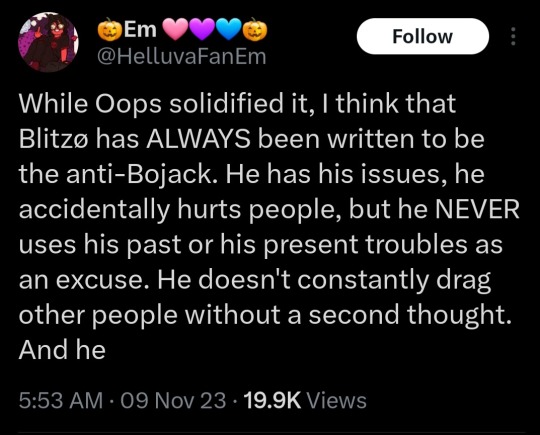
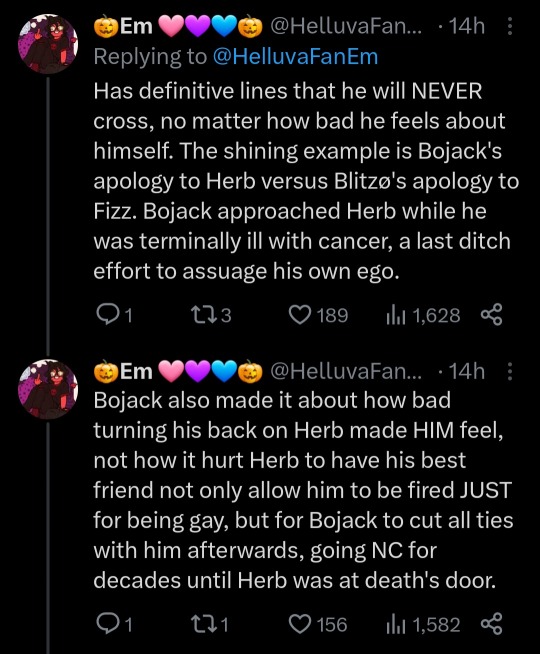
For one, Bojack’s entire character is that he doesn’t intentionally hurt others. He has his reasons that fundamentally comes from a weak sense of self associated with a child who never had the emotional support he needed growing up. Those aren’t excuses, those are the reasons. Bojack has an unhealed inner child who wants to be a good guy, but he is so caught up in his self-loathing and resentment that he doesn’t do anything about that inner child. Instead he indulges these immature emotions through self medicating with drugs and alcohol, lashing out, promiscuity, and careless spending. These are the symptoms of the problem, the problem does lie in past trauma. The issue is Bojack doesn’t see the solution as himself, but someone or something else. In my post comparing Bojack and Todd’s relationship to Blitz and Moxxie, I pointed out how Bojack and Blitz treat their “closest friends” exactly the same by verbally abusing them and tearing down their abilities. While not always consciously intentional for Bojack, it is to keep Todd feeling codependent on Bojack and thus never leaving him which is abusive and manipulative. For Blitz, the narrative says it's because he is aware of his behaviour and is intentionally pushing Moxxie to be better, which is abusive and manipulative.
My point herein being that these are the same people. There is no Anti-Bojack happening here. If anything, Blitz is more malicious in his abuse seeing as he appears actively aware and intentional in how he mistreats Moxxie. Bojack is abusive towards Todd, but in a way that is a reflection of Bojack. And the series acknowledges how Bojack's inability to be alone actively harms his other relationships. Not just Todd.
In one way, however, Blitz absolutely is the Anti-Bojack. Blitz externalizes the source of his behavior to a character failing on Moxxie's part. And the series reaffirms and justifies Blitz's abuse as okay.
The other misconception of this post is thinking that an explanation is an excuse. Creative Screenwriting did an interview in 2019 with Raphael Bob-Waksberg’s process and philosophy of writing Bojack Horseman, quoting him for the title of the article, “Characters should be understandable in their vulnerabilities.” What Medrano’s fans fail to do, fundamentally, is understand. Their opinions and twitter orations are so barren of understanding that one must ask if they simply choose to ignore what does not serve their narrative or if they really are just incapable of comprehension.
They see Blitz’s mother’s death as a reason for his attitude more than his behavior. His behavior then necessitates that it needs to be excusable. As such, Blitz cannot actually make mistakes. Things happen by chance rather than a deliberate choice on any of the characters’ behalf. The fire in Oops wasn’t a mistake made by Blitz, if it is anyone’s mistake, it is the no-named imp who lit the candle before getting to the room. Blitz didn’t intend to bump the other performer, he just happened to turn at that moment. His mistake, then, is one that only makes sense on a metanarrative aspect. His mistake was deciding not to confess his feelings to Fizz. Which… no. As novel as the concept of the butterfly effect was in 2015, the fundamental nature of something inconsequential being attributed to a disaster negates blame. No one is going to blame the butterfly for a hurricane. Similarly, Blitz’s decision to not confess has nothing to do with the fire, in fact the fire itself is not even his accident. His contribution begins and ends with accidentally bumping the other imp; a situation that would have been entirely harmless if not for another character’s unrelated decision made off-screen.
Additionally, Blitz is a heinously insufferable individual who has been nothing but insulting and abusive to his “friend” throughout the series. He sexually abuses Moxxie in Harvest Moon by touching his penis against his will. He threatens to rape Moxxie and Millie in Murder Family. Blitz humiliates Moxxie through emasculation by masculinizing Millie over Moxxie, mocking Moxxie’s anatomy through his weight and genital size, and degrading Moxxie’s hobbies and abilities. Often without any prompting whatsoever and for Blitz’s own personal enjoyment. Blitz simply is a malicious individual, and at one point the series seemed to know that. The issue isn’t that Blitz is an awful person, it’s the lack of acknowledging that fact. The fans and Medrano conveniently ignore who this character is and what he has done to justify him instead of seeking to understand him. This is a running theme throughout the show.
I also briefly compared the scene in Oops to Herb and Bojack in this post, but I didn’t focus so much on the characters and more the metanarrative reason why Bojack worked and Helluva Boss didn’t.
Here, let’s look at why Bojack went to see Herb: Because Herb told him to. Unlike the scenario between Fizz and Blitz where they didn’t see each other for fifteen years and then conveniently run into each other and just so happen to be spotted by Crimson and Striker who, for some reason, know all about Fizz and Ozzie being a thing and they just keep Blitz around because … he’s the main character. Sure, one could argue both Crimson and Striker have a personal thing against Blitz, makes you wonder why they didn’t, you know, do anything to him? No torture or revenge of any kind, he’s just there now. Conveniently tied up and kept with Fizz instead of literally anything else they could have done with him. There is no internal logic to the characters as to why things turn out this way. As seen in the Mammon episode, it's a metanarrative compulsion to make sure Blitz is in every episode regardless of whether it makes sense or goes anywhere, or not.
Another sidebar, but the fact that so much of the series is not able to be explained within the narrative and requires an understanding of how Medrano and her team formulate a script is a huge issue. It removes the ability to properly dissect the characters as individual people and necessitates a reading of them that is how Medrano wants the audience to think about them. When it comes to the character dissections, it is effectively impossible to have a complete or coherent reading in regards to the literary philosophy of the Death of the Author. You have no story or character if you remove Medrano. The world as a whole completely falls apart unless you inject it with her metacommentary and narrative intention like one would preserve a corpse through glycerin. There is absolutely no substance here. And the longer she goes on, trying to compile the whole show into a coherent narrative of its own is like building a skeleton with a human ribcage, an ostrich spine, an elephant skull and the lower half of a barbie doll.
Bojack calls Herb after finding out he is dying from cancer, Herb tells Bojack to come visit him. He refuses to talk to Bojack any other way, and Bojack is compelled to go by his guilt, not ego. Herb calling him to his house obliterates Bojack’s ego, this is Herb’s home and he is the one being summoned. This is where Herb has the most power compared to, say, over the phone. This is not only a move of superiority on Herb’s part, but an act of submission on Bojack’s. Herb forces Bojack to come to him. Once again, this is what power dynamics look like. But, despite the resentment and awkward bitterness, he does want to see Bojack.
I don’t know how many times I can articulate this. Herb is the one in control and he is the one who wants to see Bojack and he is the one calling the shots. Not at all comparable to Fizz being kidnapped, forced to interact with Blitz and then wholly reliant on him due to the narrative in order to facilitate this forced reconciliation. Herb and Bojack are people with complex feelings and agendas. Blitz and Fizz are two dolls being smashed together and held in place by the will of a childish god.
Second, the reason Bojack calls Herb is because he feels guilty, not for abandoning Herb but because he betrayed Herb. He told Herb he would stand with him and walk off the show if they tried to fire his friend, but according to Bojack, he was a coward and didn’t keep his word. He feels guilt for that, he regrets it. But when he apologizes to Herb for it, Herb corrects him. It isn’t because Bojack didn’t keep his word, like the horse man thought, it was because he thought the betrayal was more important than their friendship.
He’s a coward, but not for staying on Horsing Around. He’s a coward because he didn’t believe in their friendship. They were together for years and Herb thought that meant something, but Bojack avoiding Herb and never reaching out to him showed how little their friendship meant to him. And it wasn’t because Bojack didn’t care, Herb knows that. And that fact is necessary to understanding the sequence. Bojack didn’t value the friendship because he thought he was valueless. He avoided Herb because he thought Herb would never forgive him, because that is how little Bojack thinks of himself. Him calling Herb is the active display of him still not forgiving himself, so he needs Herb to do it for him. And Herb knows all of this.
“You know what your problem is? You wanna think of yourself as the good guy. Well, I know you better than anyone else and I can tell you that you're not. In fact, you'd probably sleep a lot better at night if you just admitted to yourself that you're a selfish goddamn coward, who takes whatever he wants, and doesn't give a shit about who he hurts. That's you. That's BoJack Horseman."
Bojack has no value in himself, leaving him extremely fragile. So he took what he wanted, he took their relationship and defined it for both of them. He ran away, protecting himself while determining that this is what Herb would want, and left Herb alone and powerless even in his closest friendship. Which is why Herb demands Bojack come to see him, it’s Herb reclaiming his power in the relationship. And all of this only has any meaning if you clearly define the fact that Bojack apologized for the wrong thing.
There’s an alternate universe where Bojack doesn’t go back and apologize at all, and he and Herb rebuild their friendship anew in Herb’s last days and they simply, quietly agree to start over. Because that’s not off the table. Herb still values the telescope. He still values their friendship. Bojack, once again, takes it away. And Herb, a dying man, fights viciously to keep hold of it. Him not forgiving Bojack is not wanting his friend back, if anything, it’s because he desperately wants Bojack back that he won’t forgive him.
The telescope isn’t just a metaphor when it breaks. It's the symbol of their friendship the entire time, and the physical actions taking place over it are a screenshot of what happened. Bojack took their friendship and left with it. But it meant something to Herb, and you would only know that by how he fights over it now. And when it breaks it shows that, because of Bojack and his cowardly need to run away from his problems, their relationship is now, finally, beyond repair. Not because Herb didn’t forgive him. It wasn’t over when Herb didn’t forgive him. Bojack ended it, not Herb.
But just like Bojack, Medrano and her fans believe that forgiveness is the end all of the story. It’s why so many people were not invested in Fizzarolli and Blitz makeup. Because Fizz just forgiving Blitz makes everything they went through meaningless. It strips the characters and what they went through of depth and nuance in a single moment. It also validates Bojack's general mindset in the belief that one moment can fix a systemic problem. In this case, Medrano isn't the Anti-Bojack, she just is Bojack.
The issue between Herb and Bojack wasn’t the job, or even the time. It was Bojack. And it is the failure of Bojack identifying the part of himself that resulted in this outcome, and not making the choice to do anything different that results in the end of everything. Maybe Herb would never have forgiven the Bojack who left him. But that’s why Bojack needed to be a different Bojack. And he wasn’t.
Wrapping this back around to the start of the essay and how Absurdist philosophy plays into Bojack intrinsically, Herb says exactly that truth to Bojack. That if Bojack was only honest to himself and lived authentically, maybe he would be able to sleep at night. Because being good is less important than being real.
This reminds me of Jean Baptiste Clamence from Camus’s The Fall. A Frenchman in the seedy center of Amsterdam, a city encircled by canals like the rings of hell. He spends his nights in the bar just outside of the red light district, drunk off his ass, it is uncertain if he is actually telling his story to anyone at all. Over the course of four nights, he tells his story of his fall from grace. His self exile to Hell after being unable to cope with his guilt. He tells so many stories of himself, egotistically claiming he has the lost panel of the Ghent Alterpiece in his apartment, the piece titled The Just Judges.
Even his name is a plea for repentance. John. Baptist. Clemency. He claims to sleep with Judges looming over him. Words endlessly flow from him and he confesses his sins.
It’s when he fesses to witnessing the suicide of a young woman in Paris that he explains why he ran away to Netherlands. He says how she called for help after jumping into the water, but he quickly fled the scene, hearing the splashing below become eerily silent. One could argue that he couldn’t do anything. In the Paris winter, the freezing water of the canal could kill them both, let alone the dangers of trying to save someone who is drowning. The main concern being the victim drowning their savior in a frenzied panic of keeping themselves above the water. It could be said that he did the only thing he could. However, he knows she was aware he was there, so she called out to him specifically when she came to her senses. No one witnessed the incident or knew he was there but her, and no one could fault him for doing nothing.
But he feels the guilt in himself, and thus runs away.
Jean-Baptiste, Bojack and even Diane all have the same mentality. They fetishize their misery and trauma, making themselves important through the loops of suffering they inflict on themselves. Thinking that because the events happened to them, it must mean they are somehow special. That their damage meant something out of all the other people on this planet who suffer. That because they felt alone and responsible, they are a mythical chosen one selected from the masses to do something. They find value in the negative self-image they have, their pain being their purpose.
Because if it didn’t matter, why did it happen to them?
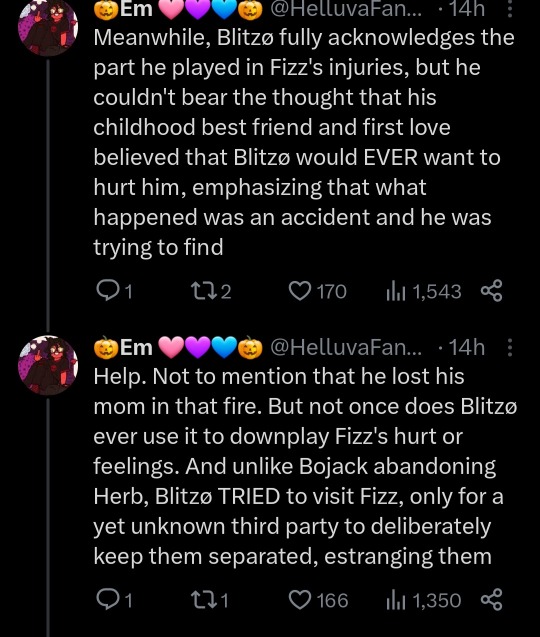
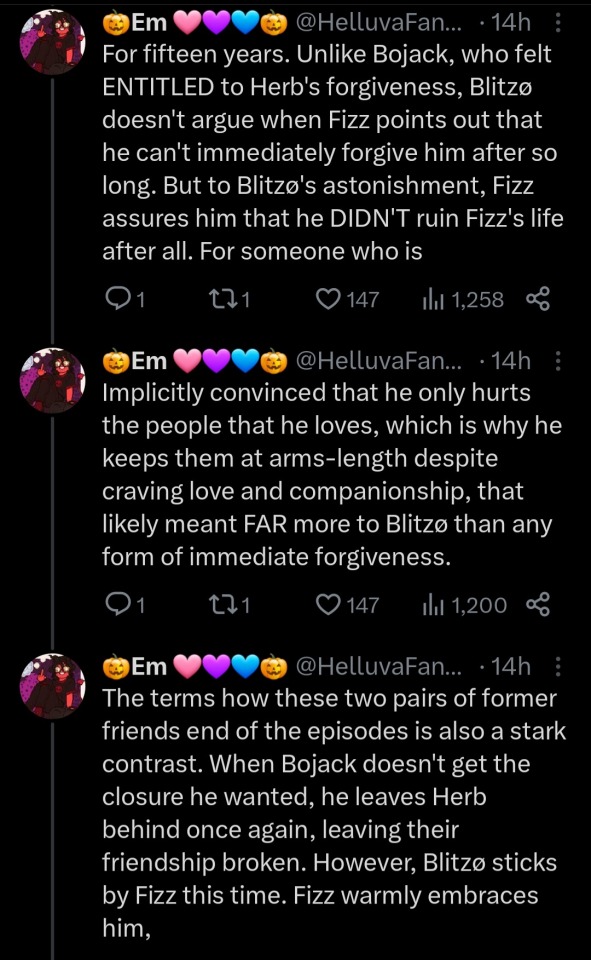
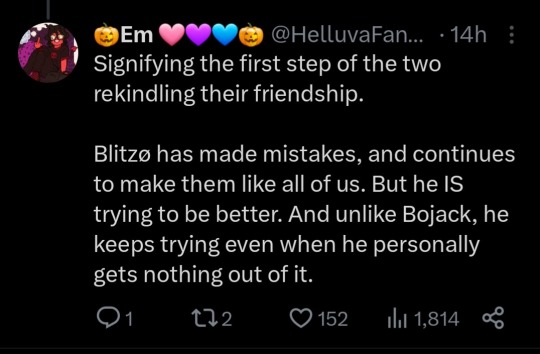
This is where I normally would keep just ripping apart the arguments, but frankly, there isn’t one anymore. For one, the original poster just blatantly lacks any fundamental understanding of Bojack as a series since the entire premise of the show is every season Bojack tries to change.
On a narrative basis, the lack of intentionality on Blitz’s part absolves him from needing forgiveness. Fizzarolli forgiving him holds no weight because Blitz didn’t intentionally set the fire, he didn’t see Fizz in the explosion when he ran away, he didn’t not try to see Fizz in the hospital and then Medrano puts the cherry on top about how Fizz’s life is actually better because of everything that happened. It’s equal parts boring and vile. The conflict is artificial, the resolution is repulsive and contrived. There is no depth to these characters and Medrano actively removes depth, either because she herself lacks the ability to comprehend it or because she knows her fans are incapable of doing so.
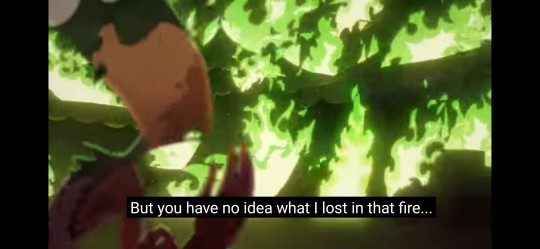
Also, let's just not comment on how this line explicitly overshadows Fizz's trauma. Everyone knows you don't end an apology with "but". That negates the whole apology. This is literally "I'm sorry you got hurt and I can never make that up to you, BUT my mom's dead so you don't even know what it's like being me and feeling responsible for that."
While the writers of Bojack sought to make their characters understandable and thus empathetic, they at no point excused or retconned the behavior. The writers on Bojack didn’t do anything to justify their characters, they were not at all focused on controlling how the audience felt about the characters. They were showing that the characters were well rounded, had reasons, why they had those reasons, what core memories made them who they are today. And the audience had the choice in how they responded to the characters. Medrano needs her audience to feel the same way about her characters as she does in order for the story to work, because she has never put forth the effort of actually telling this story.
One does not need the interviews with Bob-Waksberg to understand his cast and their story. Everything a viewer needs to know can be found in the show proper. There are not huge points of context happening just over there, off screen, between episodes and relegated to background details. Everything relevant to these characters and their stories is in the show. That has not and at this point never will be the case for Helluva Boss. So in many ways, yes. Helluva Boss is the anti-Bojack.
That's not a good thing.
#tw sa mention#philosophy#bojack horseman#bojack horseman spoilers#helluva boss critical#helluva boss critique#helluva boss criticism#vivienne medrano#vivziepop#vivziepop critical#spindlehorse critical#spindlehorse criticism#vivziepop criticism#long post#lots of repetition in places#i get philosophy is dense#its sometimes hard to grasp#especially for this fandom#sources#helluva long post#writing critique#critical thinking#essay writing
186 notes
·
View notes